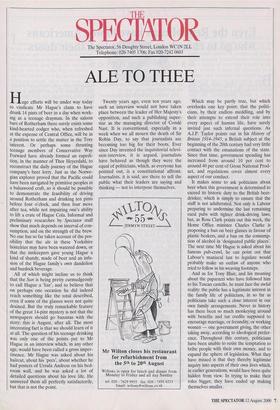The Spectator, 56 Doughty Street, London WC1N 2LL Telephone: 020-7405
1706; Fax 020-7242 0603
ALE TO THEE
Huge efforts will be under way today to vindicate Mr Hague's claim to have drunk 14 pints of beer in a day when work- ing as a teenage drayman. In the saloon bars of Rotherham there surely exists some kind-hearted codger who, when refreshed at the expense of Central Office, will be in a position to settle the matter in the Tory interest. Or perhaps some thrusting teenage members of Conservative Way Forward have already formed an expedi- tion, in the manner of Thor Heyerdahl, to reconstruct the daily journey of the Hague company's beer lorry. Just as the Norwe- gian explorer proved that the Pacific could have been navigated by primitive peoples in a balsawood craft, so it should be possible to demonstrate the feasibility of driving around Rotherham and drinking ten pints before four o'clock, and then four more after tea, while not impairing one's ability to lift a crate of Hague Cola. Informal and preliminary researches by Spectator staff show that much depends on interval of con- sumption, and on the strength of the brew. No one has so far taken account of the pos- sibility that the ale in these Yorkshire hostelries may have been watered down, or that the innkeepers gave young Hague a kind of shandy, made of beer and an infu- sion of the Hague family's own dandelion and burdock beverage.
All of which might incline us to think that the Sun is being pretty curmudgeonly to call Hague a 'liar', and to believe that on perhaps one occasion he did indeed reach something like the total described, even if some of the glasses were not quite drained. But the truly remarkable feature of the great 14-pint mystery is not that the newspapers should go bananas with the story; this is August, after all. The most interesting fact is that we should learn of it at all. The question of his teenage drinking was only one of the points put to Mr Hague in an interview which, in any other age, would have been called a gross imper- tinence. Mr Hague was asked about his haircut, about his 'pees', about whether he had posters of Ursula Andress on his bed- room wall, and he was asked a lot of detailed questions about his love life. He answered them all perfectly satisfactorily, but that is not the point. Twenty years ago, even ten years ago, such an interview would not have taken place between the leader of Her Majesty's opposition, and such a publishing super- star as the managing director of Conde Nast It is conventional, especially in a week when we all mourn the death of Sir Robin Day, to say that journalists are becoming too big for their boots. Ever since Day invented the inquisitorial televi- sion interview, it is argued, journalists have behaved as though they were the equal of politicians, which, as everyone has pointed out, is a constitutional affront Journalists, it is said, are there to tell the public what their leaders are saying and thinking — not to interpose themselves. Which may be partly true, but which overlooks one key point: that the politi- cians, by their endless meddling, and by their attempts to extend their role into every aspect of human life, have surely invited just such infernal questions. As A.J.P. Taylor points out in his History of Britain 1914-1945, a British subject at the beginning of the 20th century had very little contact with the emanations of the state. Since that time, government spending has increased from around 10 per cent to around 40 per cent of Gross National Prod- uct, and regulations cover almost every aspect of our conduct.
It makes sense to ask politicians about beer when this government is determined to exceed its historic duty to the British beer- drinker, which is simply to ensure that the stuff is not adulterated. Not only is Labour preparing to undermine the last remaining rural pubs with tighter drink-driving laws; but, as Ross Clark points out this week, the Home Office minister Charles Clarke is proposing a ban on beer glasses in favour of plastic beakers, and a ban on the consump- tion of alcohol in 'designated public places'. The next time Mr Hague is asked about his famous pub-crawl, he can point out that Labour's maniacal lust to legislate would probably make an outlaw of anyone who tried to follow in his weaving footsteps.
And as for Tony Blair, and his moaning about the paparazzi who have followed him to his Tuscan castello, he must face the awful reality: the public has a legitimate interest in the family life of politicians, in so far as politicians take such a close interest in our own family arrangements. Never in history has there been so much monkeying around with benefits and tax credits supposed to encourage marriage, or fecundity, or working women — one government giving, the other taking away, according to ideological prefer- ence. Throughout this century, politicians have been unable to resist the temptation to bribe people with their own money, and to expand the sphere of legislation. What they have missed is that they thereby legitimise inquiry into aspects of their own lives which, in earlier generations, would have been quite hidden from view. In trying to make their roles bigger, they have ended up making themselves smaller.


























































 Previous page
Previous page